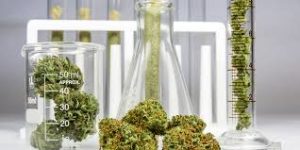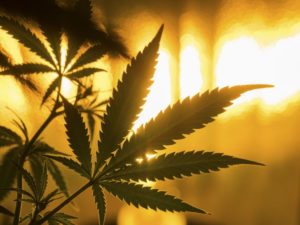The time is now to button up and enforce our medical marijuana testing requirements in Rhode Island.
 As a practicing physician I foresaw a need years ago for accredited analytical testing labs to ensure the safety and accurate labeling of medical marijuana products for patients in Rhode Island. Many of my cancer patients have asked me for advice over the years on cannabis as an alternative medicine for a variety of symptoms. With all of the pre-existing stereotypes around marijuana use in society and the lack of formal education on the endocannabinoid system and cannabinoid effects in the human body during medical school, I was initially skeptical about the true medicinal potential of marijuana. After years of reviewing the existing scientific literature and anecdotal evidence gathered from the experiences of my patients I have come to the conclusion that marijuana has been unfairly treated by our federal government in being outlawed as a Schedule 1 controlled substance, which by definition implies that it has no therapeutic benefit and high potential for addiction and abuse. Labeled in this way, it finds itself listed alongside other dangerous drugs such as cocaine, heroin, LSD, and ecstasy. This has been largely due to negative political propaganda spawned by the war on hemp that was waged by the textile and paper industries in the early 1900s, and bolstered by the alcohol and pharmaceutical industry giants through big money lobbying efforts to date. The truth is, however, that marijuana has historically been used as an effective medicine for thousands of years, and there has never been a single human death recorded in history due to overdose, which is much more than what can be said about modern pharmaceutical drugs. Suffice it to say that I now believe with certainty that marijuana has a wide range of medicinal benefits, especially when consumed in a dose-controlled manner that is suitable to an individual’s metabolic needs.
As a practicing physician I foresaw a need years ago for accredited analytical testing labs to ensure the safety and accurate labeling of medical marijuana products for patients in Rhode Island. Many of my cancer patients have asked me for advice over the years on cannabis as an alternative medicine for a variety of symptoms. With all of the pre-existing stereotypes around marijuana use in society and the lack of formal education on the endocannabinoid system and cannabinoid effects in the human body during medical school, I was initially skeptical about the true medicinal potential of marijuana. After years of reviewing the existing scientific literature and anecdotal evidence gathered from the experiences of my patients I have come to the conclusion that marijuana has been unfairly treated by our federal government in being outlawed as a Schedule 1 controlled substance, which by definition implies that it has no therapeutic benefit and high potential for addiction and abuse. Labeled in this way, it finds itself listed alongside other dangerous drugs such as cocaine, heroin, LSD, and ecstasy. This has been largely due to negative political propaganda spawned by the war on hemp that was waged by the textile and paper industries in the early 1900s, and bolstered by the alcohol and pharmaceutical industry giants through big money lobbying efforts to date. The truth is, however, that marijuana has historically been used as an effective medicine for thousands of years, and there has never been a single human death recorded in history due to overdose, which is much more than what can be said about modern pharmaceutical drugs. Suffice it to say that I now believe with certainty that marijuana has a wide range of medicinal benefits, especially when consumed in a dose-controlled manner that is suitable to an individual’s metabolic needs.
Contrary to popular belief, the real health risks in consuming marijuana lie not within the plant itself or its active metabolites (cannabinoids and terpenes), but in the potential contaminants that can be introduced during cultivation and product manufacturing. Marijuana plants are typically cultivated in a soil matrix, from which they extract water and nutrients for growth. However, it’s not uncommon for other harmful environmental contaminants to leach from soil, air or water sources and accumulate within the plant as well. Among these are pesticides, bacteria/mold, and heavy metals (commonly found in soil) such as arsenic, cadmium, mercury and lead. Inhaling or ingesting these contaminants can have serious adverse health consequences for the consumer, especially if they accumulate in the body over time. Additional contaminant risks are present for products such as edibles, oils and concentrates that are manufactured from cannabinoids that are extracted from the plant using various chemicals as a solvent. If not fully removed from the extracted cannabinoid oil, harmful solvents such as butane, chloroform, methanol, benzene and acetone may find their way into finished products and ingested by the consumer. It is therefore critically important that all marijuana products sold in state-legal markets undergo strict regulatory testing for cannabinoid content, potency, and potential contaminants to ensure that patients and consumers are not put at unnecessary risk.
 As a physician doing my part for the sake of my patients to stay abreast of relevant information within the rapidly expanding global marijuana industry over recent years, I have come across a number of appalling reports of contaminated marijuana products being sold in state-legal markets due to poor regulatory oversight, unqualified or disingenuous laboratory practices, and/or outright industry fraud. Even in “regulated” state markets, where product testing is required, it is reported that up to 70% of available products are found to be contaminated or mislabeled for content and potency, the latter of which makes it virtually impossible for a medical marijuana patient to use these products effectively at a targeted dose, and predisposes any consumer to an inconsistent and unpredictable experience.
As a physician doing my part for the sake of my patients to stay abreast of relevant information within the rapidly expanding global marijuana industry over recent years, I have come across a number of appalling reports of contaminated marijuana products being sold in state-legal markets due to poor regulatory oversight, unqualified or disingenuous laboratory practices, and/or outright industry fraud. Even in “regulated” state markets, where product testing is required, it is reported that up to 70% of available products are found to be contaminated or mislabeled for content and potency, the latter of which makes it virtually impossible for a medical marijuana patient to use these products effectively at a targeted dose, and predisposes any consumer to an inconsistent and unpredictable experience.
So how can this rapidly growing industry garner patient/consumer trust and function on a sustainable level going forward to ensure that its products are safe, consistently manufactured, and accurately labeled to allow consumers some element of predictability and control over their intended experience? The answer is simple: we absolutely need competent regulatory testing labs as a gatekeeper to the legal market. More importantly, we need universally standardized operating procedures, rooted in science, that reflect industry best practices for representative sampling, homogenization, and analysis of various types of cannabis products to ensure the accuracy and consistency of product labeling. What we currently have instead is widespread variability of regulatory measures that govern cannabis laboratory practices across state-legal markets, and there are still some legalized states that don’t even require product testing at all for fear that there aren’t enough accredited labs to test the entire volume of marketed products without risking bottleneck delays in getting these products to patients who rely on them for therapeutic relief.
Cannabis testing laboratories are not only scarce in number, but are also scarce in expertise. Cannabis chemists constantly face challenges as they process highly variable products in various forms (dried flower, oils/concentrates, edibles, beverages, etc.) into a uniform mixture that is suitable for analysis. The active components in marijuana are easily altered by heat or chemical additives during this processing phase, and great care and expertise must be used by chemists to ensure that their individually developed processing procedures preserve the integrity of the active ingredients found in these products so the resulting data from the analysis remains accurate. Finding qualified chemists with sufficient experience in cannabis analysis can be very challenging, but is an essential element of laboratory success in the industry. Given the unmet demand for cannabis testing labs at present, it is common to see traditional environmental chemistry labs attempt to take on cannabis as a service line for additional revenue. These conversion labs commonly fail to deliver consistent and accurate results however, due to an inherent lack of knowledge of the pitfalls involved in analyzing cannabis relative to the traditional soil or water samples they are familiar with. Prolonged wait times, inaccurate results, and high product failure rates under these circumstances can threaten service line viability, and desperation can lead to fraudulent behaviors in attempt to retain business. Falsification of results can lead to contaminated or inaccurately labeled products making it to market.
 Earlier this year, myself, another physician, and a PhD chemist with rare expertise in cannabis analysis co-founded PureVita Labs to solve these very issues for the medical marijuana patients in Rhode Island. The launch in July of our 6,800 square-foot facility in West Warwick, dedicated to comprehensive regulatory testing of marijuana and hemp products in the state represents the culmination of three years of ideation, design and construction of what we envision as the “premier” cannabis testing laboratory in New England. With our collective industry knowledge and expertise we’ve designed the facility with strict environmental controls, the most state-of-the-art equipment, and a staff of specialized chemists and biologists with extensive knowledge and experience in the cannabis industry. As physicians and scientists, we recognize that high-quality analytical testing laboratories are crucial to the success of a medicinal cannabis industry, and are the only thing that stands to prevent potentially harmful, contaminated products from reaching our patients. It is imperative that medical marijuana products are consistently manufactured and accurately labeled for content and potency so that patients may use these products in a controlled manner to determine their individually effective dose, minimize undesirable side-effects, and offer some degree of consistency in their experience. We have designed our facility to meet DEA-accreditation standards for sterility and environmental controls, and have incorporated the latest approved technologies to maximize regulatory processing efficiency and accuracy of results for product labeling. The medical marijuana patients in Rhode Island have waited long enough for assurance that their products are safe and accurately labeled.
Earlier this year, myself, another physician, and a PhD chemist with rare expertise in cannabis analysis co-founded PureVita Labs to solve these very issues for the medical marijuana patients in Rhode Island. The launch in July of our 6,800 square-foot facility in West Warwick, dedicated to comprehensive regulatory testing of marijuana and hemp products in the state represents the culmination of three years of ideation, design and construction of what we envision as the “premier” cannabis testing laboratory in New England. With our collective industry knowledge and expertise we’ve designed the facility with strict environmental controls, the most state-of-the-art equipment, and a staff of specialized chemists and biologists with extensive knowledge and experience in the cannabis industry. As physicians and scientists, we recognize that high-quality analytical testing laboratories are crucial to the success of a medicinal cannabis industry, and are the only thing that stands to prevent potentially harmful, contaminated products from reaching our patients. It is imperative that medical marijuana products are consistently manufactured and accurately labeled for content and potency so that patients may use these products in a controlled manner to determine their individually effective dose, minimize undesirable side-effects, and offer some degree of consistency in their experience. We have designed our facility to meet DEA-accreditation standards for sterility and environmental controls, and have incorporated the latest approved technologies to maximize regulatory processing efficiency and accuracy of results for product labeling. The medical marijuana patients in Rhode Island have waited long enough for assurance that their products are safe and accurately labeled.
Based on the known failings of the regulatory measures implemented in some of the other states, we are fortunate that the regulations for marijuana product testing that were developed by the RI Department of Health and finalized in January of 2019 are well-designed and thorough in scope. These regulations mandate testing of all medical marijuana products in their final form for content/potency, water activity (as a measure of susceptibility to mold prior to packaging), microbial contaminants, residual solvents, toxic metals, and pesticides. PureVita Labs remains the only analytical testing laboratory in Rhode Island that possesses the capability (equipment and expertise) to perform all of the required elements of regulatory testing for marijuana products, with customized processes for products of all forms to ensure the highest level of accuracy in product labeling. To date however, testing for content/potency, water activity, and microbial contaminants are the only segments of the full set of regulations that are being enforced, and only for dried flower and concentrates. We anxiously await full enforcement of the regulations to include product testing for toxic metals, residual solvents, and pesticides to be able to provide medical marijuana patients complete assurance that their products are safe for consumption. PureVita Labs is currently certified to perform regulatory testing for toxic metals (which will not be enforced until late December of this year), and will soon be the only lab certified to perform regulatory testing for pesticides and residual solvents (the enforcement date of which is yet to be determined). Edible products (such as gummies, candies, cookies, etc) which make up about 20% of the retail market are currently not required to be tested, but we anxiously await enforcement of regulatory testing for those products as well now that our methods have been approved by the state to do so.
As Rhode Island continues to inch toward legislative approval for adult use (recreational) marijuana legalization, it is our vision and goal to establish the new standard for marijuana product testing such that Rhode Island may achieve regional excellence and serve as a model regulated state marijuana program within the budding East Coast cannabis industry and beyond.
